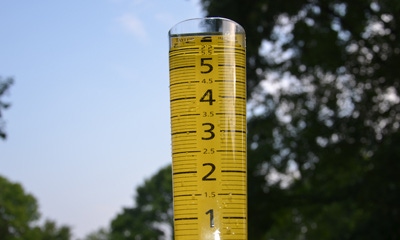
Suppose you’re trying to decide whether to gear up to make late-season nitrogen applications with a high-clearance sprayer. The theory sounds good, but you read one report that says it pays off big — then another that says it doesn’t pay at all. Who do you believe, especially when money is tight for machinery upgrades?
The panel of Indiana Certified Crop Advisers tackles this question. Panelists include Jamie Bultemeier, A&L Great Lakes Labs, Fort Wayne; Gene Flaningam, Flaningam Ag Consulting LLC, Vincennes: and Bryan Overstreet, Purdue University Extension ag educator, Jasper County.

BIG WEATHER IMPACT: Agronomists say one unknown that makes it difficult to know if late-season N pays is weather. If your rain gauge topped out after applying N, maybe late-season N will help.
Bultemeier: Let’s look at the benefits of late-season N from both sides. While late-season N may not lead to a yield increase, could it lead to the same yield with fewer inputs of N? Fundamental business profit strategy is to either increase output with the same inputs, or get the same output with fewer inputs. Either way, the story is, greater efficiency of inputs leads to greater profit.
Overstreet: My answer is, “It depends.” How early did you make your initial N application? Are you where it stayed too wet for over three weeks for any fieldwork, and your N was already applied? Did you have cover crops that could still be releasing N? These and several other questions need to be answered before you spend lots of money on machinery and fertilizer.
Flaningam: The economics of spoon-feeding corn depend on soil type, hybrid, rainfall and final yield potential of each field. Soil type would be the biggest issue. Soils with low cation exchange capacity hold less N and water than high-CEC soils. Hybrid response to late-season N application needs to be reviewed with your seed dealer. Rainfall during the growing season may have caused excessive N losses. Nitrogen source and application equipment availability needs to be reviewed as well. Also, consider field damage, due to operator error, that could occur from equipment wheel tracks.
Bultemeier: The key to late-season N application is nitrogen-use efficiency. If N is not the yield-limiting factor, yield may not increase with late-season N. It has been shown that effective late-season N management can maintain yields with 30% to 40% less nitrogen use. These kinds of results come with experience and experimentation. Increased nitrogen-use efficiency management takes skill and patience. It may take more than one growing season to get your program dialed in.
Overstreet: If you applied your N at the proper rate and in a timely manner, and did not lose it to denitrification or leaching (due to excessive rains), I think you should be fine. If you did not apply enough N earlier, or if you lost it and the crop needs additional N to reach the economic optimum yield, it could be beneficial to apply more N at tasseling.
About the Author(s)
You May Also Like




